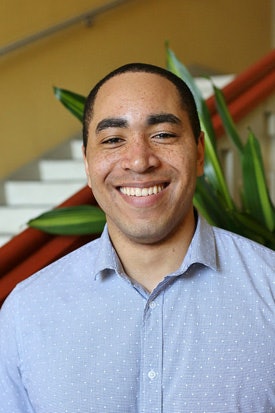A new guide out this week from the Penn Center for Minority Serving Institutions (CMSI) at the University of Pennsylvania is giving students a framework to begin their journey to a Ph.D.
The free, “easy-to-use” resource, “A Guide for Minority Serving Institution Students Applying for a Ph.D.,” uses “conversational language” and draws on CMSI researchers’ personal experiences and other resources to assist students attending minority serving institutions (MSIs) as they apply for doctoral programs, said Daniel Blake, the guide’s lead author and a research associate at CMSI.
 Daniel Blake
Daniel Blake“There is so much untapped academic potential among MSI students, and encouraging students who might otherwise be intimidated by the process to follow through will result in more diverse Ph.D. enrollment, and ultimately a more diverse professoriate,” added Blake, a current Ph.D. student at UPenn’s Graduate School of Education.
Key areas of the Ph.D. application process that the guide covers include choosing where and when to apply to a program; how to prepare for the Graduate Record Exam (GRE); identifying Ph.D. faculty with similar research interests and understanding their role in the admissions process; information about the writing sample and personal statement components of the application; and funding for a program.
Similar to challenges faced by first-generation students applying to undergraduate programs, some underrepresented students are not aware of the “hidden curriculum” necessary to apply and enter a doctoral program, Blake said.
“In addition to being aware of financial factors such as application fee waivers and the fact there is sometimes room to negotiate stipends, students need to know the importance of reaching out to program faculty well in advance of application deadlines, and strategies for making the most of their communication with them,” he added.
MSI students should begin researching potential programs the spring or summer before they apply to a Ph.D. program. Further, students should apply for Ph.D. programs their senior year of college as applications are usually due the winter prior to the intended fall semester that the program begins, the guide recommends.
Connecting with letter-of-recommendation writers and potential Ph.D. faculty advisers several months in advance of the deadline is also critical to give students time to build connections and submit strong letters of recommendations, researchers noted.
In his own Ph.D. application experience, Blake said he wishes he had known not to be discouraged when faculty did not respond to his emails – something he said students should be aware of because it may signal that the faculty member will probably not be an attentive adviser.
“Students should also beware of faculty who only talk about how they can further their own research agenda,” Blake warned. “The best advisers don’t simply want to create clones of themselves, but to empower their students to pursue their own lines of inquiry.”
When writing a statement of purpose and identifying a writing sample to submit with an application, CMSI researchers encouraged students to begin early and lean on mentors and peer reviewers to give feedback and help in the writing-revision process.
“Consider framing your statement with an anecdote that illustrates something important about your journey and your interest in the discipline,” the guide says about the statement of purpose. “Demonstrate your familiarity with the discipline but at the same time recognize that you have much to learn; discuss what you are most curious about within the field and why you wish to study it.”
The guide’s conclusion offered several additional resources for MSI students to consult during their Ph.D. application process: “A Guide to Graduate School for Students at Minority Serving Institutions,” Journey to the Ph.D.: How to Navigate the Process as African Americans and “Applying to Graduate School: Tips, Timeline, and Tools of the Trade.”
Tiffany Pennamon can be reached at [email protected]. You can follow her on Twitter @tiffanypennamon.


















